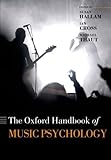Oxford handbook of music psychology / edited by Susan Hallam, Ian Cross and Michael Thaut
Material type: TextPublication details: Oxford : Oxford University Press, 2009 [dvs 2008]Description: xiii, 585 s. : illISBN:
TextPublication details: Oxford : Oxford University Press, 2009 [dvs 2008]Description: xiii, 585 s. : illISBN: - 978-0-19-929845-7
- 781.11 22
| Item type | Current library | Call number | Status | Barcode | |
|---|---|---|---|---|---|
| Book | Högskolan Väst Övre plan / Upper floor | 781.11 Oxford | Available | 6004300019688 |
PART I - THE ORIGINS AND FUNCTIONS OF MUSIC / EDITED BY IAN CROSS; 1. The nature of music and its evolution; 2. Universals in music processing; 3. Music and meaning; 4. The social and personal functions of music in cross-cultural perspective; PART II - MUSIC PERCEPTION / EDITED BY IAN CROSS; 5. The perception of pitch; 6. Tonal cognition; 7. The perception of musical timbre; 8. Musical time; 9. Components of melodic processing; 10. Memory for music; PART III - RESPONSES TO MUSIC/ EDITED BY DONALD A. HODGES; 11. Bodily responses to music; 12. Emotional responses to music; 13. The relationship between musical structure and perceived expression; 14. Aesthetics; 15. Musical preferences; PART IV - MUSIC AND THE BRAIN / EDITED BY ANIRUDDH D. PATEL; 16. The neurobiological basis of musical expectations; 17. Disorders of musical cognition; 18. Music, musicians and brain plasticity; 19. Music and the brain: three links to language; PART V - MUSICAL DEVELOPMENT / EDITED BY DAVID J. HARGREAVES; 20. Prenatal development and the phylogeny and ontogeny of music; 21. Music lessons from infants; 22. Music in the school years; 23. The impact of music instruction on other skills; PART VI - LEARNING MUSICAL SKILLS / EDITED BY SUSAN HALLAM; 24. Musical potential; 25. Practising; 26. Individuality in the learning of musical skills; 27. Motivation to learn; 28. The role of the family in supporting learning; 29. The role of the institution and teachers in supporting learning; PART VII - MUSICAL PERFORMANCE / EDITED BY RICHARD PARNCUTT; 30. Measurement and models of performance; 31. Planning and performance; 32. Sight-reading; 33. Performing from memory; 34. Movement and collaboration in musical performance; 35. Emotion in music performance; 36. Optimising physical and psychological health in performing musicians; PART VIII - COMPOSITION AND IMPROVISATION / EDITED BY PETER WEBSTER; 37. Making a mark: the psychology of composition; 38. Musical improvisation; 39. Children as creative thinkers in music
The field of Music Psychology has grown dramatically in the past 20 years, to emerge from being just a minor topic to one of mainstream interest within the brain sciences. However, until now, there has been no comprehensive reference text in the field. This book provides, for the first time ever, a comprehensive overview of the latest developments in this fast-growing area of research, with contributions from over fifty experts in the field. Written by leading experts, the 52 chapters are divided into 11 sections covering both experimental and theoretical perspectives, each edited by an internationally recognised authority Ten sections each present chapters that focus on specific areas of music psychology: - the origins and functions of music - music perception - responses to music - music and the brain - musical development - learning musical skills - musical performance - composition and improvisation - the role of music in our everyday lives - music therapy and conceptual frameworks In each section, expert authors critically review the literature, highlight current issues, and explore possibilities for the future. The final section examines how in recent years the study of music psychology has broadened to include a range of other scientific disciplines. It considers the way that the research has developed in relation to technological advances, fostering links across the field and providing an overview of the areas where the field needs further development in the future. The Oxford Handbook of Music Psychology will be the essential reference text for students and researchers across psychology and neuroscience.
